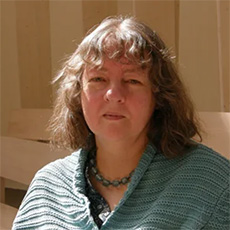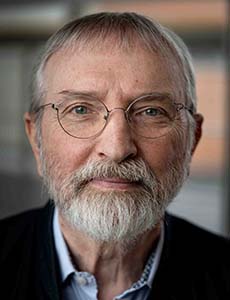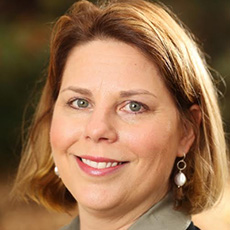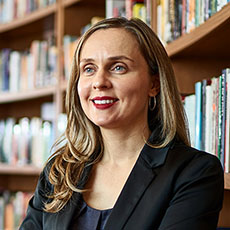Reverend Dr Joanna Collicutt: Psychology and Theology
 Joanna is a clinical psychologist and Anglican priest based in the University of Oxford. After a long and varied career in the British health service and academia her work now mainly focuses on psychology of religion and Christianity and the arts.
Joanna is a clinical psychologist and Anglican priest based in the University of Oxford. After a long and varied career in the British health service and academia her work now mainly focuses on psychology of religion and Christianity and the arts.
She studied experimental psychology and (later) theology at Oxford University, and clinical psychology and (later) Christianity and the Arts at King’s College, London. Joanna’s clinical work was mainly in the area of neurology and her first PhD was on fear and anxiety following acquired brain injury. Her work in psychology of religion has focused on psychology and the Bible. Joanna’s teaching has been in the areas of pastoral care, especially in the areas of ageing, mental health, and dementia; in the area of spiritual formation, especially the use of insights from positive psychology; and in spirituality and the arts. She is currently pursuing a second PhD at King’s College London on the Visual Commentary on Scripture. Joanna has been passionate about the interface between theology and psychology since she was a teenager. Books include The psychology of Christian character formation. SCM, 2015; Being mindful, being Christian. Monarch/SPCK, 2016; Thinking of you: A spiritual resource for people with dementia. BRF, 2016; Neurology and religion. Cambridge University Press, 2019; Death and life: A church’s guide to exploring mortality. BRF, 2024; So longeth my soul: A reader in Christian spirituality. SCM, 2024.
Professor Armin Geertz: Cognitive Science of Religion
 Armin W Geertz is Emeritus Professor at the Department for the Study of Religion and Former Fellow of Aarhus Institute of Advanced Studies, Aarhus University. Armin does research on Indigenous religions, Comparative Religion, Mythology and Folklore, and Extreme Religiosity and Mysticism. He also works in the Cognitive Science of Religion, Evolutionary Theories of Religion, and in Method and Theory in the Study of Religion.
Armin W Geertz is Emeritus Professor at the Department for the Study of Religion and Former Fellow of Aarhus Institute of Advanced Studies, Aarhus University. Armin does research on Indigenous religions, Comparative Religion, Mythology and Folklore, and Extreme Religiosity and Mysticism. He also works in the Cognitive Science of Religion, Evolutionary Theories of Religion, and in Method and Theory in the Study of Religion.
Professor Geertz uses a variety of methods spanning historical study, fieldwork, experiments and text mining. He is senior editor of Journal for the Cognitive Science of Religion and the Advances in the Cognitive Science of Religion series (both at Equinox). He has served as President of the International Association for the Cognitive and Evolutionary Sciences of Religion.
Professor Rebekah Richert: Developmental Psychology of Religion
 Rebekah A. Richert earned a bachelor’s degree in psychology (BA) from Calvin College (1999) and a PhD in Psychology from the University of Virginia (2003). Funded by a National Science Foundation International Post-Doctoral Research Fellowship, she was a postdoctoral fellow with Dr Harvey Whitehouse at Queens University-Belfast (2003-2004) and with Dr Paul Harris at the Harvard University Graduate School of Education (2004-2005).
Rebekah A. Richert earned a bachelor’s degree in psychology (BA) from Calvin College (1999) and a PhD in Psychology from the University of Virginia (2003). Funded by a National Science Foundation International Post-Doctoral Research Fellowship, she was a postdoctoral fellow with Dr Harvey Whitehouse at Queens University-Belfast (2003-2004) and with Dr Paul Harris at the Harvard University Graduate School of Education (2004-2005).
Dr. Richert is co-Director of the Developing Belief Network, a global collaborative of researchers studying influences of culture and religion on early cognitive development. She has developed various lines of research into how children’s developing social cognition influences their understanding of religion, fantasy, and media. In particular, she studies cultural and developmental mechanisms in the development of concepts of God, the soul, prayer and rituals, as well as children’s commitments to the reality status of religious entities and the efficacy of religious practices. Bridging the study of developing fantasy-reality distinctions, Dr Richert also examines how the fantastical content and characters in children’s media can both support and hinder children’s learning from books, videos, and interactive games. Her research has been funded by the National Science Foundation, the Social Science Research Council, The John Templeton Foundation, and the Templeton World Charity Trust.
Dr Renate Ysseldyk: Health Psychology, Aging, and Religion
 Renate Ysseldyk, PhD, is Associate Professor of Health Sciences and Director of the Social Identity and Health Lab at Carleton University in Ottawa, Canada. Before joining Carleton, she completed postdoctoral work at the University of Exeter (UK) and the University of Queensland (Australia), funded by the Social Sciences and Humanities Council of Canada (SSHRC) and the Canadian Institute for Advanced Research (CIFAR). Her current work has been funded by grants from SSHRC, the International Research Network for the Study of Science & Belief in Society (INSBS), and the Centre for Aging & Brain Health Innovation (CABHI).
Renate Ysseldyk, PhD, is Associate Professor of Health Sciences and Director of the Social Identity and Health Lab at Carleton University in Ottawa, Canada. Before joining Carleton, she completed postdoctoral work at the University of Exeter (UK) and the University of Queensland (Australia), funded by the Social Sciences and Humanities Council of Canada (SSHRC) and the Canadian Institute for Advanced Research (CIFAR). Her current work has been funded by grants from SSHRC, the International Research Network for the Study of Science & Belief in Society (INSBS), and the Centre for Aging & Brain Health Innovation (CABHI).
As a social and health psychologist, her research focuses on the social determinants of health among potentially vulnerable populations (e.g., older adults living with dementia, caregivers, individuals who have experienced discrimination, trauma, or illness). She takes an interdisciplinary, mixed-method, and community-based approach to contribute toward understanding and promoting individual mental health, and healthy societies more broadly, by focusing on three interconnected themes: 1) healthy ageing, 2) (non)religious, ethnic, and gender identities, and 3) coping with stress. Her research program is thus grounded in a social identity framework for studying the influence of psychosocial factors on coping with stressful experiences and life transitions amid a primarily medicalized landscape of care.
